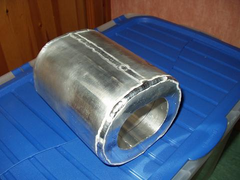
couple of TIG questions
andrew-theasby - 22/6/08 at 10:31 PM
Hi, been getting a bit of aluminium welding practice in today, ive pretty much taught myself how to do it by reading the tips other people have
posted, but have just come across a couple of problems i could do with some advice on please:-
1 im pretty ok now at doing an external weld on a corner, but when it comes to doing internal ones, i seem to be using loads of filler rod, otherwise
it undercuts the material really heavily, is there a way to reduce this, it seems like my arc is too wide as it spreads out rather than going directly
into the corner.
2 occasionally i get a few little black specs appearing in the weld, most commonly at the end of a run. What is this? Im sure im not dipping the
tungsten in anymore.
3 thinnest material i can (sometimes) do is 2mm, id like to be able to do 1.6/1.2 if poss, but even with 2mm the pedal is barely pressed before it
blows through, is there a nack to making it a bit tamer for this sort of thing?
Set up is 1.6 white tungstens, bulk buy tig set, 6 lpm argon and 1.6 mm filler rods
Any advice would be much appreciated. Thanks in advance


Rescued attachment swirl pot.JPG
907 - 23/6/08 at 03:59 PM
Hi Andrew
Firstly the foot pedal.
With most welders you set the main amp control on your welder to the max you want to use, then this is the setting
with the pedal fully depressed.
i.e. 100amps on the welder, = 0 to 100amps on the pedal.
Black specs are impurities. Clean metal and use 8 to 10 lpm of argon.
Use a 2.4 tungsten and have it protrude a little further out so it's deep into the vee of the fillet.
It's normal to use a filler rod one size thicker than the metal being welded.
You will be able to get it into the joint before it melts away, i.e. dip into the pool.
It will seem like you are using less filler rod.
I'm not familiar with your welder but if you have frequency adjustment then a higher frequency gives a more directional arc.
Your welding looks spot on. Well done on what you have done so far.
Hope this helps.
Atb
Paul G
CairB - 23/6/08 at 04:56 PM
Mine is one of the GreenBird group buy sets and I believe that the pedal is full scale irrespective of the current setting - shame really.
I have considered fitting a series resistor to get more sensitivity.
I've found that the "clear width control" - pos/neg width bias has a significant effect on the weld due to the ability to remove
oxide.
Colin
Syd Bridge - 24/6/08 at 09:17 AM
All of the cheap inverters that I encountered use full power control at the pedal.
With mine, I added another potentiometer voltage divider in the pedal power supply, to regulate percentage of max power that the pedal outputted.
If your welder has a three pin connection to the welder, one will be ~5v+(or more), one earth and one control signal. You find out which is which by
putting a voltmeter across the terminals and checking the voltage changes as you turn the main amperage control knob through its full travel.
I put the new pot in a box, which the main pedal cable hooked up to, then out again to the welder. Mark the pot 0-100%, and this will be percentage of
max power. The pot needs to go into the higher voltage positive line, before the footpedal then regulates the voltage out again.
Cheers,
Syd.
andrew-theasby - 24/6/08 at 08:58 PM
Great, thanks for the tips, ill try that, i have seen a foot pedal at work with a dial on it, didnt realise thats what it would be for.
